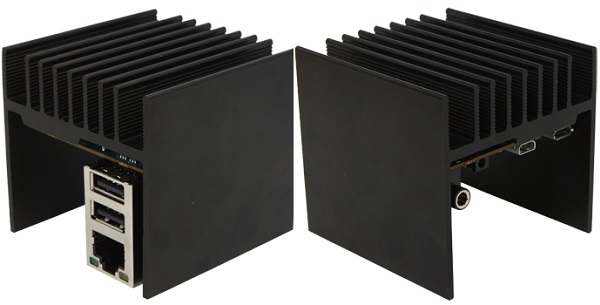The Raspberry PI Competitor: ODROID-U
Just like how phones have involved from Single Core to now Quad Core processors, the Mini PCs are making the same quantum leaps. Odroid has made available the ODROID-U and ODROID U2, two ultra compact 1.4GHz and 1.7 GHz Quad Core Boards respectively as developmental kits.
These are ARM-based processors, similar to what you might find in the Samsung Galaxy S3 or Note II. Each board is basically a tiny computer (small enough to fit in your palm) with an ARM Cortex-A9 processor, support for Ethernet and USB connections, and the ability to run Android or Ubuntu Linux. Prices start at just $69 and can be purchased directly from HardKernel.
ODROID-U is a micro sized open development platform which is powered by Exynos4412 1.4Ghz ARM Cortex-A9 Quad Core, with 1GB of RAM and 400 MHz Mali 400 quad-core graphics. The Odroid-U2 has more computing power, equipped with a 1.7GHz Quad Core, 2GB of RAM and 440 MHz Mali 400 quad-core graphics. Both are equipped with 2 USB ports, 10/100 Ethernet, a headphone jack, and a micro HDMI port. There’s no inbuilt storage, so you would have to equip an eMMC flash module or an external microSD card. This also means you can replace Operating Systems on the fly, just by swapping in and out the memory cards.
These are not the same as the MK808 or MK802s which are fully equipped out of the box. Additional accessories such as WiFi adapter, Power Supply, HDMI cable, MicroSD etc would be required. But if you are a developer or a geek, you would likely have some of these accessories lying around. Both prices include worldwide shipping and one other nice little bonus. The industrial-chic aluminum heatsink pictured above (which doubles as an semi-open case for the ODROID-U) is included, too. On the firmware side of the equation, Hardkernel is providing downloadable images of both Android and Ubuntu.
The ODROID-U2 and ODROID-U will begin shipping on December 21 and January 16 respectively. They’re available for pre-order now, as is an upgraded version of the ODROID-X.
Key Features of the ODROID-U/U2
* Low-cost development platform
* Ultra compact size with full metal enclosure
* Quad core ARM Cortex-A9 MPCore
* 10/100Mbps Ethernet with RJ-45 LAN Jack
* 2 x High speed USB2.0 Host port
* Android 4.x & Ubuntu 12.10
Competition in the Market
Both boards are very similar to the Raspberry PI. The Raspberry Pi is a similarly sized credit-card sized computer that plugs into your TV. However, the new boards significantly out-powers it.
 Comparing the size and dimensions, the new boards are likely to be similar to what will eventually end up in the Ouya, the $99 Android Gaming Console, which would likely hit the market in a couple of months time as well.
Comparing the size and dimensions, the new boards are likely to be similar to what will eventually end up in the Ouya, the $99 Android Gaming Console, which would likely hit the market in a couple of months time as well.
Software Compatibility
The ODROID-U and U2 are powerful boards and more than capable to run the current list of demanding android software. It is able to run XBMC really well, even though XBMC as a software is still not really optimised for Android devices yet. Perhaps the Linux version for XBMC could be tried out for even better performance. And for additional functionality, the Ubuntu image with OpenGL support allows you to run the full-suite of Linux programs. We should start seeing more devices incorporated with ARM-based boards due to their efficient computing at a low cost. Perhaps in car computers and in-flight entertainment perhaps?

One Reply to “The Raspberry PI Competitor: ODROID-U”
Excellent goods from you, man.